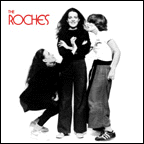If anyone were making list of significant cultural achievements of the 20th century. Jazz, abstract art, the great modern poets like Rilke, Pessoa, Stevens, Cavafy. The invention of motion pictures, a wholly new art form. The development of myriad genres of popular music (Bossa nova!) and graphic art. Who would include in this list the conservative reaction against modernism? Mid-century "academic" poetry of the 1950s? Wilbur, Nemerov, Justice... It would be hard to make a case. Surrealism, jazz, the movies, comic strips, made an impact on the culture, defined the look and feel of the century.
Interruption: Time to let on a bit of my own strange world: I keep an internal list of blogging tendencies/cliches of individual bloggers & poetry bloggers in general. There's the "This is why I don't subscribe to the Poetics list" link cliche, etc. Anyway, I like a lot of what's on Bemsha Swing, but there's one thing that irks me, & I'm interested in Mayhew's take on this. It's an aspect that I've given a label to. It's called Mayhew's Fallacy, which is just simply assuming that the reason someone has fundamentally different tastes than yours is because they are less sophisticated/informed/etc.
A rhetorical question a few months ago concerning W.S. Merwin & David Shapiro lodged itself in my mind & put me on the lookout for this tendency in JM, myself & others. I think it was the implied lack of self-questioning or self-skepticism that struck me.
Yesterday, at some point, a term, one that might be already coined (probably is), presented itself to me concerning this tendency: cultural privilege.
A context: Will Oldham aka Bonnie "Prince" Billy aka Palace Music recently released a greatest hits disc where one of his personas covers the songs of a different persona -- fans voted for songs on a website & Oldham re-recorded them with veteran session players in Nashville. The results, I think, are wonderful: a completely new context for the songs & the songs work regardless of your previous exposure to the songs or knowledge of Oldham. The new recordings are classic Nashville, in the perhaps mid 70s Don Williams & Charlie Rich sense -- richly layered, dramatically rendered songs with the vocalist as almost a guest star in the track, narrating some situation that the music describes. Really interesting, I think, aesthetically. Before I'd heard the album I read reviews from Pitchfork and other hipster review mags that aging hipsters like myself read, and none of them seemed able to approach Oldham's decision to recast the songs as he did as an aesthetic decision -- many thought it was a joke, or a test perhaps. There's nothing in the tracks to suggest a lack of sincerity, at least to my ears. But I think these reviewers were listening from a position of cultural privilege, & a hip, smart musician like Oldham seriously & sincerely working in Nashville didn't fit the privileged paradigm where sloppiness & tape hiss equal integrity. So reviews were either dismissive, or jokey (one review was in the form of a CB broadcast) -- apparently country is ok when recorded cheaply or primitively, but not when done professionally.
Back to Mayhew. I don't know if it was on Jonathan's blog, or others', or both, but folks' reaction to the inclusion of Billy Collins & Rita Dove in the BAP seemed to be "well, this is David Lehman's influence" or "a marketing decision". I also was surprised by the inclusion of Collins/Dove/etc., but to present what I think is a realistic question: isn't it possible that Hejinian just liked the poems? That she found them to be of value & was able to read them with an open mind? To harp on Mayhew: in his great BAP Bob vs. Yusef grudge match that we reprinted in Octopus #2 there seemed to be a similar tendency informing his commentaries, that Creeley would only include Maxine Kumin or Donald Hall because they're old buddies, not that there was something there in the poem that was interesting/moving/engaging. I need to go back & reread to see if the same charge is leveled against Komunyakaa when he goes outside his expected range, or if he's praised for being adventurous.
I haven't read the new Best American Poetry, but the Dove & Collins etc. are the poems I'll read first. & I'm also kind of excited by the fact that Hejinian picked these poems. I liked Dove's 2nd book a lot, & I've always just dismissed Collins out of hand after reading a dozen or so poems-- I like the fact that Hejinian's selections have got me second guessing my own paradigms, however slightly.
& to be a jerk, I think that reaction is a healthier one than the privileged one, a reaction that doesn't presuppose that one has it all figured out & everyone else has to catch up. I often think that, of course -- it takes a poet of Hejinian's stature I guess to jostle me.
So, in summary: Go Tost.
I really am the thinking man's Zukofsky!
***
I also hope Hejinian doesn't make any sort of big self-congratulatory deal in her intro about including these unexpected poets because that would simply swing attention away from the poems themselves and towards her own open mindedness. I bring this up simply because there's a small thing in the new Fence that I've been wanting to blog about: there's two pieces by Kyle Kenner titled "Drafted" & "The Man in the Window". The pieces seem to graft elements of Stein & Tate. Fairly interesting. All good, except for the following footnote at the bottom of the page:
Kyle Kenner currently attends school at Coke R. Stevenson Middle School in San Antonio, Texas; he is in the 8th grade, and enjoys writing and reading fiction.
Well, if I was Kyle Kenner I'd be pissed off -- no one else has a bio at the bottom of their page. It's as if Fence is saying "hey, aren't we cute that we're publishing this kid -- don't take it too seriously though, it's just a kid -- but anyway, aren't we cute?" Maybe Kyle Kenner is actually Kent Johnson and the bio is part of the piece. But otherwise, I say either print the pieces like everyone else's or don't run them.
It's just kind of chickenshit, actually, at an important level: no paradigms or assumptions are threatened by this decision: the bio note right there below the poems (I noticed the footnote before the pieces) makes sure of that. If they would've ran the pieces & readers liked them and wanted to know who this new voice was & then they turned to the bios in the back with all the Real Poets, the readers would've had a healthy little jarring when finding that this was a middle-school aged poet working. But maybe Fence just didn't want to take the risk that their readers thought Fence actually decided that the poems stood up on their own as poems and not just as adventures in stunt editing. Is this like a small glimpse at a lack of seriousness behind Fence? That's probably ungenerous. But the question presents itself, I think.







